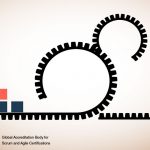An important feature of SCRUM is little number of roles. These Roles have direct influence on the realization of a project. The SCRUM core roles are believed to be accountable for the production of deliverables which meet the acceptance criteria in every sprint which in turn ensures success of the entire project.
The following are the three principal roles in Scrum:
- The Product Owner- is the voice of the business,
- The Development Team- that converts ideas into functionality
- The Scrum Master -who enables the team and process
The Product Owner
The product owner is regarded to be the one who has far-sightedness of the project and is accountable for accumulating the requirements and needs to understand the value of the project.
The product owner is also responsible for dealing and listing the product backlog. He is also involved in the planning of the release.
A product Owner is typically the project manager or can also be a business analyst who has technical skills. An efficient product owner is expected to have attributes such as ample technical knowledge, needs to have domain expertize and should be easily accessible to the development team.
The Scrum Master
The Scrum Master has his/her focus on the progress of the process and also is known to guide the scrum team.
The Scrum Master is responsible for planning the sprints and prioritizing the sprint backlog. He/she is also involved in managing development process. The Scrum Master also helps in identifying and eliminating the obstacles that is currently hindering the performance of the team
The Scrum Master is responsible for preparing the burn down chart and helps in unblemished communication among one and all in the project. The scrum master enables the group to follow the workflow and ensures that the tasks in the sprints are completed on time. A Scrum Master can either be the team leader or act as the project manager. A scrum master is ideally considered to have a good balance of skills such as technical expertise, problem solver, team player and a problem solver.
The Scrum Team
A Scrum team does not mean the typical development team. A scrum team has its own special capabilities.
Stated below are few features of a Scrum team
- Cross-functional teams: the team has members from various disciplines in order to help achieve the approved functions. Software engineers, programmers, architects, analysts, system admins, testers etc. could be the members of the teams.
- Self-organizing teams: the teams take a call on tasks to be done by whom and how to complete the tasks.
- Business representation: The business representative is as the voice of the customer, and also the voice of change.
- Backlog driven: work is done as per the backlog.
The responsibilities of the development team:
- Achieve sprint goals
- To prepare self-made goals
- To organize their time









